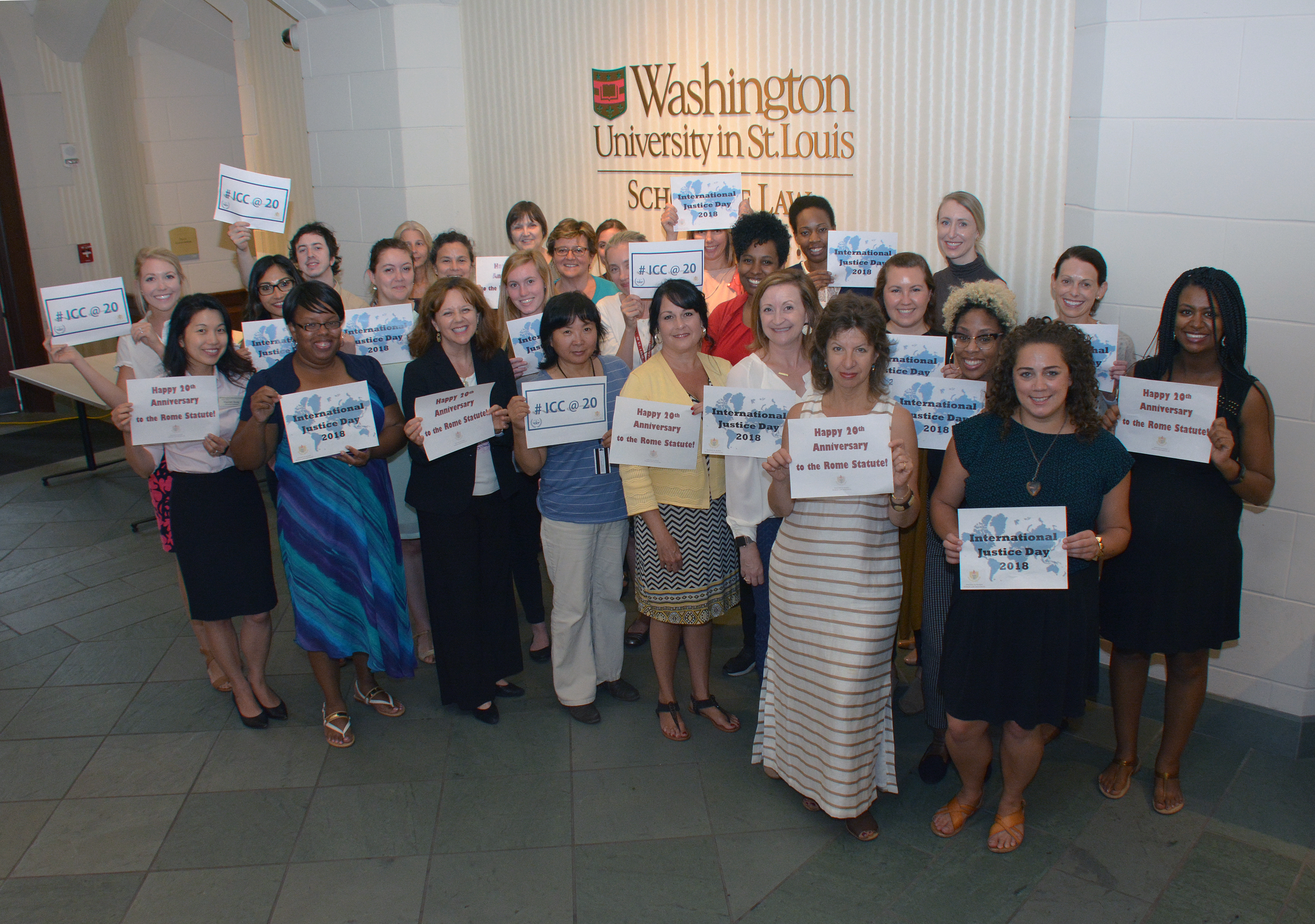By: Professor Leila Nadya Sadat

WashULaw faculty and staff show their support for International Justice Day 2018 and wish the ICC a Happy 20th Anniversary
Twenty years ago today the Rome Statute of the International Criminal Court was adopted by a vote of 120-7 after five weeks of grueling negotiations. I went to Rome to attend the conference on the advice of my late mentor, Professor M. Cherif Bassiouni, who had worked assiduously on early drafts of the Statute and had been elected Chair of the Drafting Committee in Rome. Cherif told me that I “had” to go to Rome; Cherif was right.
The conference was held in the UN’s Food and Agricultural building (“la FAO” in Italian). The building was enormous and rather ugly, except for the splendid terrace on the top floor which had an amazing view of Rome. The entire city was abuzz with the event: there were posters all over the city announcing the conference upon which were written “we expect concrete results;” Amnesty International set up a tent outside the building for information and publicity purposes; and each delegation received a small briefcase with literature and a transistor radio so that the Conference could be followed live on Radio Radicale 2. It was hot and sunny, and delegates worked feverishly to complete the Statute in the allotted time.
As a young scholar asked to Chair the ILA (American Branch) Committee on the ICC, I had attended some of the Preparatory Committee meetings at UN Headquarters in New York, but nothing prepared me for Rome. The atmosphere was simply electric. Government delegates scurried about, working, it seemed, around the clock on the 1300 provisions of the draft statute that were still undecided when the negotiations began in June. NGO representatives (quartered in the aptly-named “Sudan” Room) fanned out to listen, kibbetz, report on and lobby government delegations. Led by Bill Pace, convener of the CICC (Coalition for the International Criminal Court), the morning strategy sessions and meetings with delegations were critically important to keeping the negotiations on track. The friends I made at Rome I have had since that time, especially my NGO colleagues; each of us linked by a bond that came from participating in an extraordinary event during which so much seemed at stake. Would the international community finally commit to the dream of an international court – inspired by the horror of the First World War — that could punish the worst atrocity crimes? Would the Permanent Members of the Security Council succeed in either derailing the negotiations completely or emasculating the institution that might emerge? The Rwandan genocide and the Bosnian war were not just a distant memory; they were painful, searing events at the foremost of our minds.

ICC Prosecutor Fatou Bensouda with Professor Leila Sadat, Special Advisor on Crimes Against Humanity
As an American lawyer, the establishment of the International Criminal Court was then, and is now, an incredibly logical and simple idea (even if establishing the Court itself is complex). After all, if individual murders deserve investigation, prosecution, and punishment, why shouldn’t mass murder be a crime? How can it be that someone ordering the commission of unimaginable atrocities, or participating in their commission, can argue that they have a legal right to carry out those actions simply because they emanate from State policy or were perpetrated by state officials? The United States was deeply committed to the success of the Nuremberg trials once they were undertaken, and US Supreme Court Justice Robert Jackson’s opening Statement is one of the most brilliant bits of legal rhetoric ever written. Given our history and commitment to the rule of law, establishing an international criminal court seems completely in line with American values and interests, and important to our foreign policy and national security objectives. For this reason, I have found it difficult to understand – and been saddened by — the vehemence, sarcasm and even hatred that this new Institution seems to inspire in some of my compatriots, including the current National Security Advisor, John Bolton.
While it is true, as I have noted in a more comprehensive and scholarly posting, that the ICC faces challenges of both a political and legal nature, none of those amount to the kind of critiques that would justify the demise of this new international institution. Indeed, the opposite is true: each of my critiques suggests the need to reinforce the institution so it can carry out the work envisaged at Rome 20 years ago.
Since 2012, I have had the honor to serve the ICC Prosecutor as a Special Advisor on Crimes Against Humanity. My firsthand observation of the Court’s functioning, and interactions with its staff, has reinforced my academic work and has led me to have a deep respect for the individuals participating in this “justice start up.” It is important to criticize the work of the Court when appropriate, as I have often done in my writings, but also to recognize the critical role that the Court can and does play in the pursuit of both peace and justice.
So, happy birthday ICC! I wish the Court great future success – and the accession of many more States Parties – before its next big anniversary of 2022 (the 20th anniversary of the Statute’s entry into force and activation of the Court’s jurisdiction).
